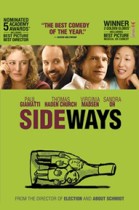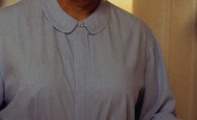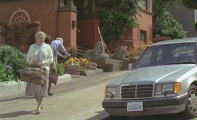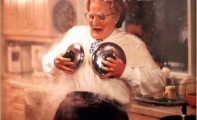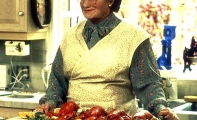Mrs. Doubtfire (1993)
Synopsis
On the surface, Mrs. Doubtfire is a sweet family-friendly comedy about a man who has to dress up as an old woman in order to spend time with his kids. Dig a little deeper and it is a film about what happens when a man dishonors his potential and sense of integrity to avoid taking responsibility for his life. It’s a classic coming of age story in peculiar wrapping, where boyish, irresponsible protagonist Daniel is forced to transform into a man who has meaning and direction in order to remain in contact with his kids.
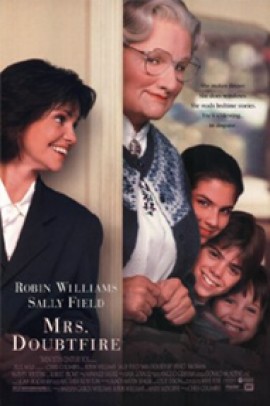
| Genre | Comedy |
| Production year | 1993 |
| Director | Chris Columbus |
| Male actors | Robin Williams, Pierce Brosnan |
Sometimes, becoming a man involves crossdressing
by Eivind Figenschau Skjellum
Preface
Mrs. Doubtfire is not your usual suspect for a website about masculinity. Strangely though, it was this movie that helped conceive this project in the first place (read more about that in “the concept“). Having helped me find deeper meaning in my life, this peculiar movie carries special meaning for me. So – let’s get started.
Introducing the child man
The film starts out as Daniel is in a recording studio giving voice to an animated, opera-singing bird which is being chased by an evil cat. Daniel is in his element, we can tell, and takes to the job with passion and enthusiasm. But the bird, in an unexpected turn of events, flips out a big, badass cigarette, lights it up and poses like a big dude. Daniel strays from the script, and produces lines that point to its moral downfall; he figures kids should not be exposed to smoking birds.
After an argument with his boss, who just wants to get the job done, he gets his boxers in a wad and quits. Daniel stands up for good morals and the need to instil wholesome values in children. Yet, there is something very childlike about him, and he seems to associate with these children more as an equal than as an authority figure or a force of protection.
It isn’t long before we are given more clues as to Daniel’s immaturity. His wife Miranda has declared that Chris, their son, can’t host a birthday party because of his poor report card (he doesn’t study enough). Daniel overrules the decision, behind her back, so that Chris can have a good time, a decision Lydia, their eldest daughter, finds suspect. There is a subtle dynamic here, symbolic of the gender reversal that’s now occurring in a large-scale fashion in the most progressive societies in the world.
Miranda – the woman – is the authority figure in the house, and Daniel is neither man enough to stand up to her strong will nor directed enough to carve out a purpose for himself. Instead, he goes behind her back, like and adolescent boy, and undermines her authority, sowing the seed of great confusion in the minds of his children. Why should they listen to their mother when he doesn’t?
In the Hillards’ household, the mother is who establishes the structure and holds the authority, and the father who breaks them down in rebellion or just fucks off. In the real world, it is perhaps rarely as extreme as here, but the presence of such a character in a (more or less) contemporary film is clear indication that the movie-makers understand currents in society whereby fathers become increasingly immature and lost, often remaining in a state of rebellion throughout most of their adult lives.
Excavating the fallen father
Daniel is chiefly identified with the role as a father; his role as husband is secondary to him. But despite his undeniable love for his kids, he doesn’t represent a strong – or a healthy – father figure. Let’s zoom out a bit and get a wider perspective on what fathers and fatherhood represent. Fathers, as symbols of the Masculine, are evolutionarily and energetically the chief authority figures in the family.
This is not a discriminating statement, but points to the natural expression of the Masculine, which leads and penetrates, while the Feminine surrenders and embraces. We have become confused in our culture by our idealization of the Masculine and trivialization of the Feminine, concluding that surrender is a weaker life expression than leading with authority.
But what normally happens when a woman surrenders in sexual embrace? The man loses control and ejaculates! In other words, true surrender is a mighty force that most men can not handle without losing themselves.
Mothers, as symbols of the Feminine, carry authority too, but it’s an entirely different type of authority, being, as it is, more aligned with the realm of emotion and the shifting energies of the moment. The father energy is the long-distance energy. Where are we going? How do we get there? When the father provides no direction, but only rebellion – against, of all people, his wife – his children, particularly his sons, get off to a terrible start in their masculine evolution.
The confused father without a rudder, a ship afloat on the tumultuous oceans of life, is a huge problem in our culture, and many of them have been relegated to the playpens of their own immature fantasies, the prisons of their fears and phobias, or the constant slumber of shutdown. These uninitiated men never really grow up, so instead of seeing themselves as figures of authority, wisdom, and inspiration, they reduce themselves to another one of the boys, hanging out with their sons’ posse, as were they one of them. That, or they don’t engage much at all, more comfortable as withdrawn in silence.
If we look at the metaphors and legends of ancient cultures, we see that the father serves as a channel for the sacred Masculine (e.g. the Sun) so that its powers can flow through him and into his children, particularly his sons. The father (capitalize him and you get God), if not himself the initiator (he normally isn’t), should prepare his son’s initiation into manhood, into the sacred bond of men that spans all time and space.
He should also, obviously, create a safe container for his daughters’ Feminine (as well as Masculine, when appropriate) expression. This is how it was in our culture, how it still is in many cultures, and still sometimes in ours. But what happens when a father is himself an adolescent, when he is reactive rather than proactive? What purpose does this father fulfil?
The wounded rebel
Daniel throws the party that Miranda denied, but gets caught red-handed. The betrayal of her trust is too much; Miranda demands a divorce. The scene shows how sickened she is by Daniel’s immaturity and how bitter she is that she, as a woman, has to be responsible for the direction of the family, the food on the table (Daniel is more interested in rebelling against his employers than putting food on his children’s table), and the structure in their children’s lives.
Daniel doesn’t realize it, but he has committed a betrayal against Miranda’s Feminine, forcing her to step out of it to take the masculine reins of the relationship. He has unwittingly, due to his own immaturity, forced her feminine radiance underground.
He has also robbed his children of a healthy masculine role model, forcing them instead to search for the main source of masculine energy in their mother, a person who is quite capable of animating it, but who nevertheless shows clear signs of not enjoying it most of the time.
There is one scene in which we overhear Daniel’s gay brother Frank speak with their mother on the phone about Daniel’s divorce. From the way Daniel reacts and his mother’s voice on the phone, it seems clear that many of his kinks and wounds, which he must now address, comes from his relationship with an overly neurotic, controlling mother. His rebellion against her, and – by the looks of it – also his father, is still being played out in his current relationships.
Laying down the challenge: Grow up or get lost
As we are propelled into the court proceedings, there may be the tendency, by those of softer bent, to feel that Daniel is being shafted by the authorities and his wife, essentially that the world is unfair to him. Beware, because that is exactly the same thinking that Daniel is now, for the first time, given a real opportunity to escape from. Daniel is not a victim of anything but his own inability to take his life seriously. There is no unfair treatment here.
How easy it is to feel that life keeps screwing us over! How easy it is to blame the “other guy”! How easy it is to keep wallowing in our own perceived victimhood; for a day, a week, a lifetime. How hard, in comparison, to sit up and say “I did this”. Every hard blow dealt by life is an opportunity to grow, and we should consider it as such. Actually, we should do it right now. No delay. Daniel has no choice. It is his turning point.
The judge in the proceedings is the first positive model of masculinity in the film. He represents both clarity and direction, as well as empathy. He is the father figure who kick-starts Daniel’s growth process by temporarily taking his children away, while leaving him very clear instructions on how to get them back. Masculine love can look pretty tough sometimes, but it is love nonetheless. And one of the main indicators of a man’s masculine core being severely wounded is his everlasting inclination to fight masculine authority as opposed to submit to it.
The initiated man knows his initiation was channeled through the spines and hearts of men of courage and authority, that his submission to this sacred bond, this masculine lineage, could flow into him only because the applied wisdom of the elders temporarily suspended his ego, and bathed his true Self in the vibrant glow – and the hungry shadows – of the primordial Man.
Daniel is not such a man. He is tightly wrapped in the fetters of his own ego, afraid of masculine love and authority. But right now he has no choice but to put his head to the ground, surrender his ego, in service of his children. He must get his shit together or forever close down, fall deeper and deeper into the puss and sting of his self-inflicted wound.
Introducing Mrs. Doubtfire
True to form, Daniel’s growth into maturity comes off to a poor start. When his court liaison, another stern woman, asks if he has any special skills, Daniel replies “I do voices!” and goes on to bathe her in comedy performances. She is not impressed and sends him off to a shoddy job packing boxes at a TV studio.
Miranda, alone with the kids, needs a babysitter. Daniel has the kids only a few hours on Saturdays and is desperate to see them more often. He depends on his children for his own happiness and seems to be attached to them in much the same way a fourteen-year old girl is attached to her first love. Miranda puts out a newspaper ad, which Daniel is lucky enough to intercept. Daniel creates Mrs. Euphegenia Doubtfire, an elderly sweet British woman who is engineered to fulfil Miranda’s every dream; for the first time, probably, he has found himself forced to see the world through someone else’s eyes.
Mrs. Doubtfire sets Daniel on the road of transformation. As her, Daniel is free from the story of his past wounds. He is free to create an identity from scratch, and conjures up a woman who has rules and the will to stand by them. She is good with the household and genuinely helps Miranda. Coupled with Daniel’s good traits as a loving, sweet person, she becomes a dream for both Miranda and the children. And Daniel gets to see that the authority he possesses as Mrs. Doubtfire is very good for the children (Chris studies again).
A flash of insight
Miranda grows found of Euphegenia, and opens up to her over the kitchen table. “It started out well” she says, speaking of Daniel, “He was so romantic, so passionate. It was Daniel’s spontaneity and energy that I fell in love with” (largely feminine qualities). “Everyone else I knew was so organised and scheduled.” (masculine qualities). “Daniel was so different. And he was so funny. But after a few years everything just stopped being funny.
” “Why?”, Mrs. Doubtfire – Daniel – asks. “Well, I worked all the time and he was always between jobs. I hardly got to see the kids. He never knew, but so many nights I just cried myself to sleep. The truth is I didn’t like who I was with him. I turned into this horrible person. I didn’t want my kids growing up with a mother like that. When I’m not with Daniel, I’m better. And I’m sure he’s better without me”. “Did you ever say anything to him, dear?,” Euphegenia inquires deeper. “Daniel never liked to talk about anything serious,” Miranda replies. “I used to think Daniel could do everything, except be serious. But then I was serious enough for everybody.”
This scene has Daniel get it for the first time. He understands that he was responsible for what happened. It is important, as we watch this scene, to remember the law of polarity in relationships, whereby there exist both feminine and masculine energies that exist in balance, as expressions to be made. When the man is not able to present his partner with masculine energy, she will have to be masculine for them both.
The woman’s masculine expression emasculates the man and he becomes more feminine by consequence; there is always an “equal” share of masculine and feminine energy waiting to be distributed. This is the law of polarity, and it is the knowledge-background we need to understand this Miranda’s unfolding. This scene has many lessons for men ignorant of the primary importance of working to maintain and grow their masculinity in their relationships. Daniel has seen his own reflection and found it blurry. He must now find some clarity.
Daniel discovers his purpose
Daniel has uncovered new inner dimensions, connecting deeper with his authentic self, a primary objective for any man. Now, he needs to fulfil another; he needs to discover a mission in life. And it comes to him through his work in the shipping department at KTVU television. They have a terrible infotainment program for kids, featuring a fossilized man fondling plastic toy dinosaurs. Daniel immediately sees what is wrong with it, and his creativity kicks into overdrive; he knows what to do.
After all, this is the one thing he knows something about in life. He tells it to the man at his side, a gentle and elderly bearded fellow, who turns out to be the owner, the head honcho. This initial conversation, followed by a series of funny and embarassing moments, have Mrs. Doubtfire become a television concept that epitomizes everything that Daniel stands for. Her show has morals, but is also very funny, very sweet. It becomes a huge hit. All of a sudden, Daniel is somebody going somewhere. There is a growing masculine force in him. His reactivitity has been turned to proactivity, and things are about to turn around.
By this time, Mrs. Doubtfire’s identity has been revealed to Miranda through a series of hysterical events in a restaurant. She has lost all respect for Daniel, and worries for his mental health. In her eyes, he is not a fit father. The key turnaround comes when Miranda sees one of Daniel’s TV shows, and recognizes how he is on purpose with his life, how he has turned the wound that expressed itself as Mrs. Doubtfire into his life’s art. She understands that he has become a responsible man, a man with direction. She feels softness in her heart and turns around.
Daniel’s children are back in his life, and Denial has turned to Daniel. But his initiation has just begun. That’s what life is like.
Conclusion
Mrs. Doubtfire is a movie with a surprising amount of insight, which portrays women and men, masculinity and femininity, with finesse and without taking sides. It has much to teach us about every man’s responsibility, to himself and to his family, to discover his true self, and live from there – even if it should temporarily involve crossdressing.

